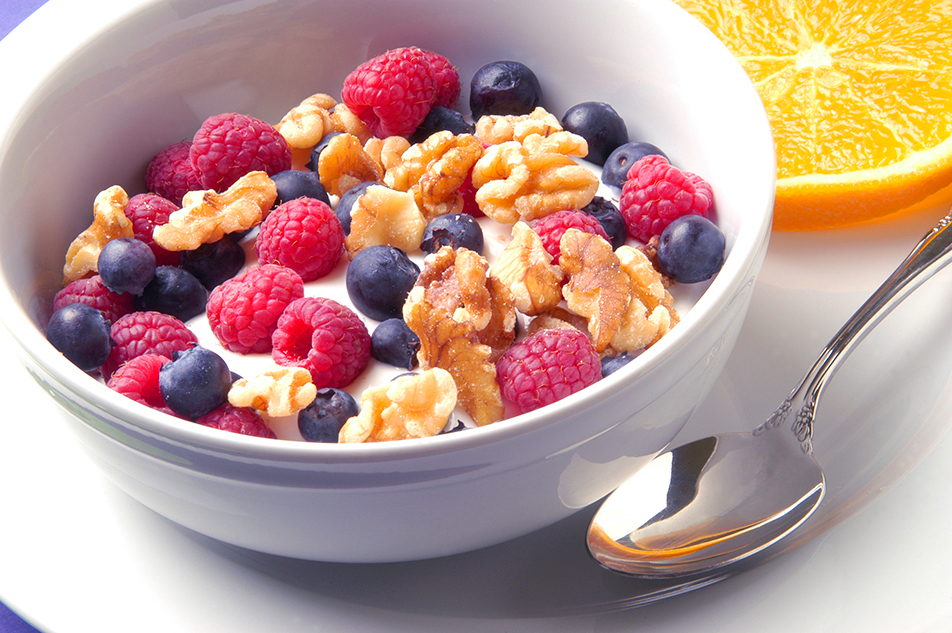
This post was written by Lauren Mullins, RDN, LD, Parkview Health.
Every year, a new food joins the spotlight and is highlighted as a “superfood” that should be incorporated into our diet to provide essential health benefits and nutrients. But do superfoods really exist? No, not really. No individual food or beverage can provide all the essential components our bodies need to be nutritionally balanced.
The word “superfood” has been used to describe foods that contain high levels of various types of vitamins, minerals or nutrients that have been linked to prevent disease or offer additional health benefits. Generally, some of the most common superfoods include fruits, vegetables, whole grains, fish, dairy, and even various spices such as turmeric, ginger and green tea.
This may sound daunting, but there’s no need to empty your refrigerator or pantry to begin boosting the nutrition content of your meals and snacks. Instead, I like to encourage making simple changes to your current habits to maximize nutrient content in your diet. A few ways to accomplish this could include:
- Adding berries and slivered nuts to your morning oatmeal.
- Adding berries, spinach, and kale to your morning smoothie.
- Opting for Greek yogurt instead of regular yogurt for more probiotics and protein with less sugar.
- Choosing whole-grain bread or pasta instead of enriched, white products.
- Decreasing the amount of red meat consumed each week and increase seafood options that are rich in omega-3 fatty acids like salmon, mackerel or shrimp.
- Choosing healthy, protein-rich snacks such as low-fat dairy products, Greek yogurt, fruits, vegetables, nuts and seeds.
- Choosing kale or spinach Instead of iceberg lettuce. Kale and spinach are substantially higher in calcium, potassium, magnesium, vitamin A, vitamin K and folate.
But, if you are searching for new superfoods to add to your grocery cart this year, try incorporating a few of the following:
- Hemp hearts: This plant-based protein can be added to smoothies, yogurt or a salad. They’re rich in amino acids, calcium, iron, zinc, magnesium, potassium, and vitamins A, C, E and some B vitamins. Hemp hearts can be found at most grocery stores near the nuts and seeds.
- Blackberries: These berries are full of antioxidants, especially anthocyanins, which give blackberries their beautifully rich color. Research has shown that this phytonutrient may help delay cognitive decline associated with advanced age. They’re also an excellent source of vitamin K and C.
- Bone broth: Bone broth is made by boiling bone or cartilage in water for many hours which allows the bone marrow and collagen to be released. Bone broth, or stock, tends to be thicker than other broths such as chicken or vegetable and can be used in sauces, gravies, stews, and to cook grains or legumes. Collagen in bone broth may support growth and maintenance of hair, skin and nails while aiding digestion.
- Sardines: This tiny fish contains small amounts of mercury but is rich in omega-3 fatty acids, vitamin B12, vitamin D, calcium, iron, magnesium and potassium. Sardines can be grilled or served as part of a salad or made into a spread for crackers.
- Goji berries: Goji berries, also known as wolfberries, have a sweet, slightly sour taste. They are typically consumed in the dried form with a one-ounce serving providing nearly 10% of your daily value for protein. They are also rich in vitamin C, fiber, iron, vitamin A and zinc.
- Sesame Seeds: Adding sesame seeds is a quick and easy way to add additional crunch to a meal along with fiber and zinc which is beneficial for shortening the length of the common cold.
- Arugula: Dark leafy greens like arugula and spinach have been linked to improving blood glucose levels, cardiovascular health and possibly lower risks for certain cancers. Two cups of arugula provide almost half of your daily dose of Vitamin A.
- Miso: Miso is a fermented food that is commonly found in paste form. Miso paste is made from fermented soybeans, salt and koji. There are several different types of miso with each providing a unique flavor depending on what foods are cooked with it. Fermented products like miso contain probiotic bacteria which may be beneficial for gut health.
Helpful resources:
Goji Berry Facts
Do superfoods exist?
The 10 Superfoods We're Already Seeing Everywhere in 2020